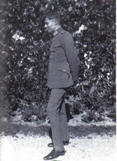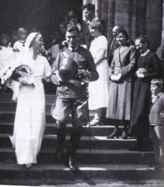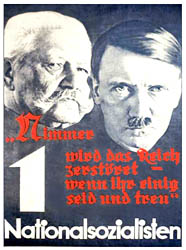![]()
Chapters
References
Early Life and Influences (Continued)
|
The
need to take action coupled with a desire to protect the state
led Stauffenberg to enlist in the German Reichswehr (German
Army, pre-Hitler) in 1926. Stauffenberg was a sickly child and
during his early days as a soldier suffered from bouts of
exhaustion to acute gastritis. Through an iron determination he
pushed past these ailments and finished his basic training.
“Claus chose the No. 17 Cavalry Regiment which, like most
regiments of the truncated post-Versailles Reichswehr, was an
amalgamation of previously existing regiments."[4] He
became a second lieutenant in 1930 and a full lieutenant in
1933. Also in this year Stauffenberg married Frehierr Nina von
Lerchenfeld who was also a member of the old Germanic nobility.
As Claus worked his way through the junior ranks of the Reichswehr Germany was embroiled in political and economic chaos. The Great Depression had already broken Germany’s economy which was already teetering on the brink due to the massive stipulations of the Versailles Treaty which ended World War One. While Reichswehr officers were discouraged from political conversation and forbidden to vote by constitutional decree, Stauffenberg did not concentrate entirely on his military career. He felt that the army was not just an instrument for war but was an important cog in the creation of a new state. “In Stauffenberg’s eyes the armed forces were one of the essential pillars of the nation, called upon to guarantee both its security and reputation."[5] This should not imply that he was in favor of the Weimar Republic. As mentioned earlier his noble birth made him to feel that he had an obligation to serve the community. “Stauffenberg was no lover of the Weimar Republic; on the other hand’ he did not approve of the attitude of some of his fellow officers, though servants of the state, who despised it. In his view, it was better to place oneself at the service of the state, even if that seemed inadequate, rather than to stand aside in ineffective arrogance."[6] While many of his colleagues insulted the black, red, and gold flag of the Weimar Republic Stauffenberg did not primarily because it was the flag of the state to which he had sworn fealty. That fealty would soon be tested when Adolf Hitler and the Nazi Party came to power. The actions of Hitler and his minions in the days before the Second World War began would erode Stauffenberg’s initial support of them and send him down a road that would lead to eventual action against “The New Order.”
Site designed and maintained by Bill Jeffers Public History at the University of North Carolina at Charlotte
|
 Cadet Stauffenberg, circa 1926  Claus and Nina von Stauffenberg - wedding day - September, 1933  The rise of National Socialism |
